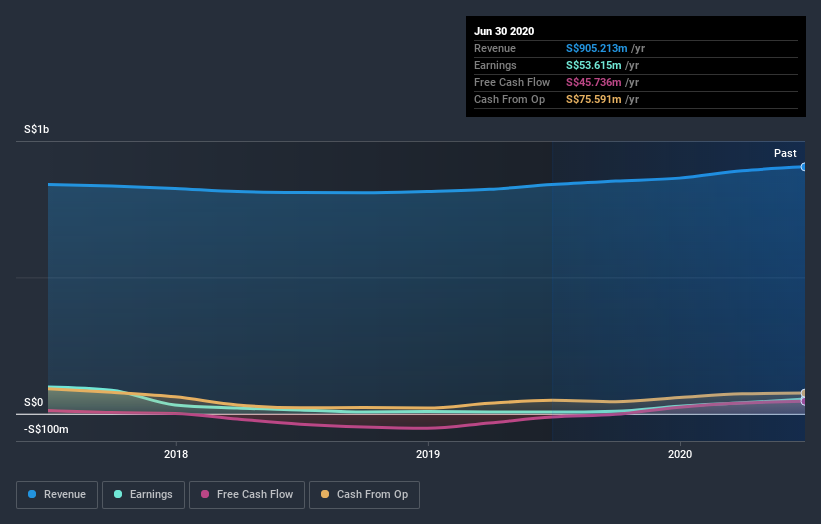What Kind Of Shareholders Hold The Majority In QAF Limited's (SGX:Q01) Shares?
The big shareholder groups in QAF Limited (SGX:Q01) have power over the company. Insiders often own a large chunk of younger, smaller, companies while huge companies tend to have institutions as shareholders. I generally like to see some degree of insider ownership, even if only a little. As Nassim Nicholas Taleb said, 'Don’t tell me what you think, tell me what you have in your portfolio.
With a market capitalization of S$518m, QAF is a small cap stock, so it might not be well known by many institutional investors. In the chart below, we can see that institutions don't own many shares in the company. Let's take a closer look to see what the different types of shareholders can tell us about QAF.
View our latest analysis for QAF

What Does The Institutional Ownership Tell Us About QAF?
Institutions typically measure themselves against a benchmark when reporting to their own investors, so they often become more enthusiastic about a stock once it's included in a major index. We would expect most companies to have some institutions on the register, especially if they are growing.
Less than 5% of QAF is held by institutional investors. This suggests that some funds have the company in their sights, but many have not yet bought shares in it. If the business gets stronger from here, we could see a situation where more institutions are keen to buy. It is not uncommon to see a big share price rise if multiple institutional investors are trying to buy into a stock at the same time. So check out the historic earnings trajectory, below, but keep in mind it's the future that counts most.

Hedge funds don't have many shares in QAF. Andree Halim is currently the company's largest shareholder with 61% of shares outstanding. With such a huge stake in the ownership, we infer that they have significant control of the future of the company. With 7.1% and 1.2% of the shares outstanding respectively, Tian Wan Holdings Group Limited and Dimensional Fund Advisors L.P. are the second and third largest shareholders.
While it makes sense to study institutional ownership data for a company, it also makes sense to study analyst sentiments to know which way the wind is blowing. As far I can tell there isn't analyst coverage of the company, so it is probably flying under the radar.
Insider Ownership Of QAF
The definition of an insider can differ slightly between different countries, but members of the board of directors always count. The company management answer to the board and the latter should represent the interests of shareholders. Notably, sometimes top-level managers are on the board themselves.
Most consider insider ownership a positive because it can indicate the board is well aligned with other shareholders. However, on some occasions too much power is concentrated within this group.
Our information suggests that insiders own more than half of QAF Limited. This gives them effective control of the company. So they have a S$335m stake in this S$518m business. It is good to see this level of investment. You can check here to see if those insiders have been buying recently.
General Public Ownership
The general public, with a 26% stake in the company, will not easily be ignored. While this group can't necessarily call the shots, it can certainly have a real influence on how the company is run.
Private Company Ownership
It seems that Private Companies own 7.8%, of the QAF stock. It might be worth looking deeper into this. If related parties, such as insiders, have an interest in one of these private companies, that should be disclosed in the annual report. Private companies may also have a strategic interest in the company.
Next Steps:
I find it very interesting to look at who exactly owns a company. But to truly gain insight, we need to consider other information, too. For instance, we've identified 2 warning signs for QAF (1 shouldn't be ignored) that you should be aware of.
Of course this may not be the best stock to buy. So take a peek at this free free list of interesting companies.
NB: Figures in this article are calculated using data from the last twelve months, which refer to the 12-month period ending on the last date of the month the financial statement is dated. This may not be consistent with full year annual report figures.
If you’re looking to trade QAF, open an account with the lowest-cost* platform trusted by professionals, Interactive Brokers. Their clients from over 200 countries and territories trade stocks, options, futures, forex, bonds and funds worldwide from a single integrated account. Promoted
Valuation is complex, but we're here to simplify it.
Discover if QAF might be undervalued or overvalued with our detailed analysis, featuring fair value estimates, potential risks, dividends, insider trades, and its financial condition.
Access Free AnalysisThis article by Simply Wall St is general in nature. It does not constitute a recommendation to buy or sell any stock, and does not take account of your objectives, or your financial situation. We aim to bring you long-term focused analysis driven by fundamental data. Note that our analysis may not factor in the latest price-sensitive company announcements or qualitative material. Simply Wall St has no position in any stocks mentioned.
*Interactive Brokers Rated Lowest Cost Broker by StockBrokers.com Annual Online Review 2020
Have feedback on this article? Concerned about the content? Get in touch with us directly. Alternatively, email editorial-team (at) simplywallst.com.
About SGX:Q01
QAF
An investment holding company, engages in the manufacture and distribution of bread, bakery, and confectionery products in Singapore, Australia, the Philippines, Malaysia, and internationally.
Flawless balance sheet average dividend payer.
Market Insights
Community Narratives



